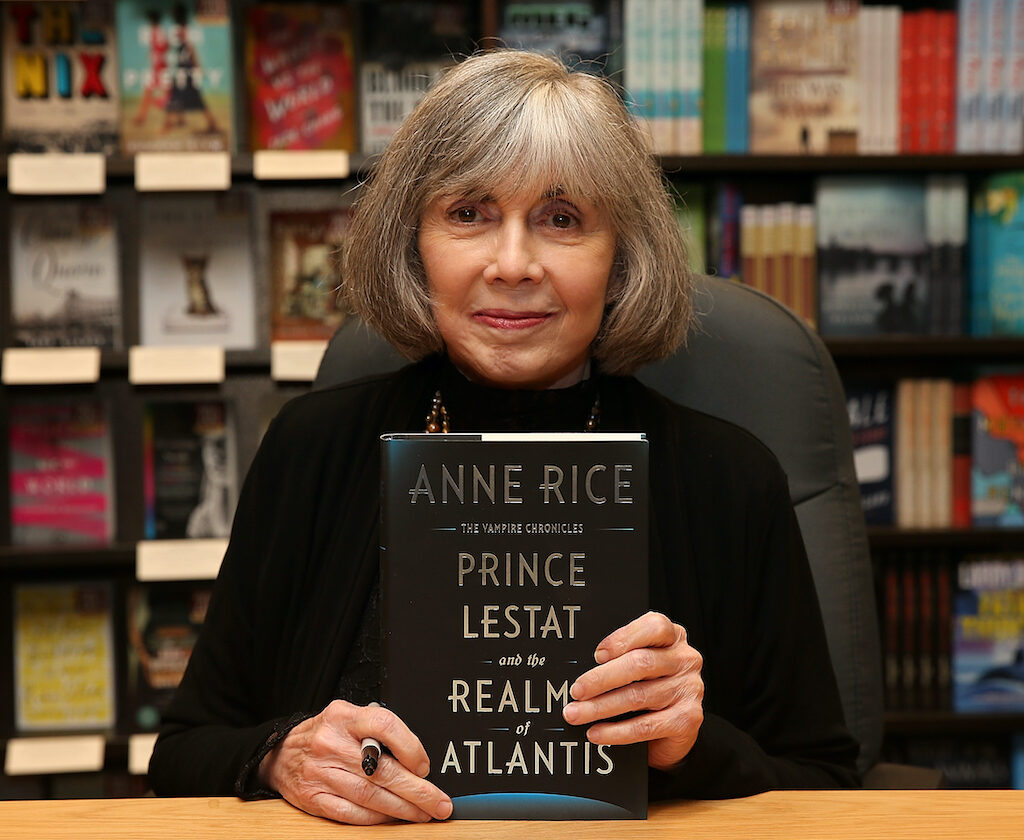As well as her literary works, Anne Rice’s legacy leaves behind questions about what it means to be a follower of Jesus.
Anne Rice, the author responsible for Interview With The Vampire and Queen of the Damned passed away on 11 December 2021 after complications stemming from a stroke. She was 80.
As well as the Vampire Chronicles books, Mrs Rice was responsible for two Christian fiction books. Both Christ the Lord: Out of Egypt and Christ the Lord: The Road to Cana fictionalised certain events from the biblical accounts of Jesus’ life.
Raised in a strict Catholic household, Rice often struggled with the faith of her family.
I had experienced an old-fashioned, strict Roman Catholic childhood in the 1940s and 1950s…We attended daily Mass and Communion in an enormous and magnificently decorated church… Stained-glass windows, the Latin Mass, the detailed answers to complex questions on good and evil—these things were imprinted on my soul forever…. I left this church at age 18…. I wanted to know what was happening, why so many seemingly good people didn’t believe in any organized (sic) religion yet cared passionately about their behavior (sic) and value of their lives… I broke with the church… I wrote many novels that without my being aware that they reflected my quest for meaning in a world without God.
Later in her life, Mrs Rice announced that she had embraced Catholicism again. In the introduction to her memoir, Mrs Rice wrote:
In the moment of surrender, I let go of all the theological or social questions which had kept me from [God] for countless years. I simply let them go. There was the sense, profound and wordless, that if He knew everything I did not have to know everything, and that, in seeking to know everything, I’d been, all of my life, missing the entire point. No social paradox, no historic disaster, no hideous record of injustice or misery should keep me from Him. No question of Scriptural integrity, no torment over the fate of this or that atheist or gay friend, no worry for those condemned and ostracized (sic) by my church or any other church should stand between me and Him. The reason? It was magnificently simple: He knew how or why everything happened; He knew the disposition of every single soul. He wasn’t going to let anything happen by accident! Nobody was going to go to Hell by mistake.
On 28 July 2010, Mrs Rice wrote a Facebook post where she expressed despair at the current state of Christianity.
“Today I quit being a Christian,” she wrote.
“I remain committed to Christ as always but not to being ‘Christian’ or to being part of Christianity. It’s simply impossible for me to ‘belong’ to this quarrelsome, hostile, disputatious, and deservedly infamous group. For ten years, I’ve tried. I’ve failed. I’m an outsider. My conscience will allow nothing else.”
However, Mrs Rice later clarified that, while she saw herself as no longer being part of the wider movement of Christianity, she remained a follower of Jesus.
“My faith in Christ is central to my life,” she wrote.
“My conversion from a pessimistic atheist lost in a world I didn’t understand, to an optimistic believer in a universe created and sustained by a loving God is crucial to me. But following Christ does not mean following His followers. Christ is infinitely more important than Christianity and always will be, no matter what Christianity is, has been, or might become.”













2 thoughts on “Anne Rice’s complicated Christianity”
Reading this actually felt very personally relevant to me. Anne Rice’s complex relationship with organized religion and her relationship with Christ is a mirror of my own. I grew up with devout Baptist family members and, I was taught early on who was “going to Heaven” and, who wasn’t… I questioned this teaching and these questions eventually led me to leave the church. It wasn’t until I was much older that I could develop and listen to the Holy Spirit in my life: the Holy Spirit was telling me that God is love and not to be upset by those who abided by obstinacy.
I have tried and tried tobe a Christian and I mean from childhood. So Anne Rice for me reflects and expresses being with Christ but not Christian.